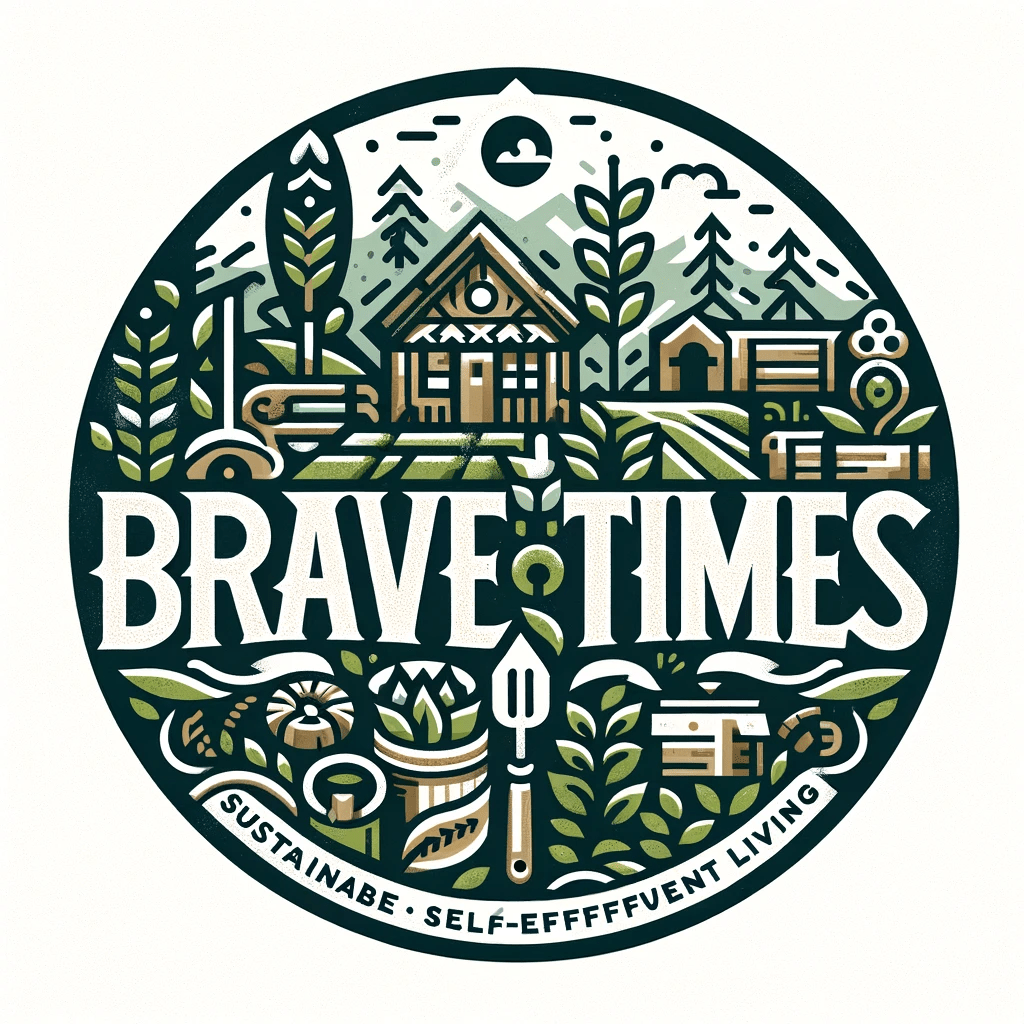In this ever-evolving world, where the weight of environmental challenges looms overhead and economic uncertainties cast their gloomy shadows, many find solace and inspiration in the concept of “Sustainable Living in an Unsustainable World”. As advocates of practical wisdom and resourceful living, we celebrate the art of self-reliance by weaving together traditional know-how and innovative approaches to tackle modern challenges head-on.
Today, I invite you to embark on a journey with me – a journey from garden gold to the kitchen table, where we explore the significance of closing the loop in the food cycle. Let’s dive into the fascinating world of sustainable gardening and composting, and discover the rewarding benefits of growing your own food and nurturing the earth in return.
At the heart of sustainable living lies the concept of self-sufficiency and resilience. With ever-shrinking spaces, it’s easy to assume that growing our own food is an unattainable dream. However, fear not! Our platform offers a treasure trove of knowledge tailored to every scenario, whether you possess a small urban balcony or a sprawling rural backyard. Our gardening guides empower you to transform your space into a flourishing oasis, where fresh produce awaits your culinary creations.
Complementing the art of sustainable gardening is the practice of composting, which transforms kitchen waste into garden gold. Yes, it’s true – those vegetable peels, coffee grounds, and eggshells hold immense potential to nourish the soil and fuel plant growth. By closing the loop in the food cycle, we reduce waste, nurture the earth, and reap the rewards of nutrient-rich, bountiful harvests. Imagine the satisfaction of sowing the seeds of sustenance and nurturing them into ripe, vibrant produce that graces your kitchen table. It’s a testament to our ability to create abundance from the seemingly mundane.
But this journey doesn’t stop at gardening and composting. We delve into the depths of self-reliance by offering insights into the world of raising chickens. Homesteading enthusiasts will find invaluable lessons in sustainable animal care, as they embark on a venture that not only provides fresh eggs but also fosters a deeper connection to the food on their plate. There’s something truly remarkable about tapping into nature’s cycles and participating in the nurturing of life.
In our pursuit of self-sufficiency, we must also examine the products we use on a daily basis within our homes. That’s where our sections on soap making and DIY household products come into play. As we advocate for a chemical-free home, we not only reduce our reliance on industrial products but also eliminate harmful toxins from our living spaces. Through affordable and accessible alternatives, we empower individuals like you to take control of their well-being, while simultaneously reducing their environmental footprint.
And let’s not forget the virtue of being a penny pincher. Within this community, we value stretching our dollar further, all while reducing our impact on the environment. From upcycling ideas that breathe new life into discarded objects, to energy-saving techniques that lighten the load on both our wallets and the planet, our suggestions are tailored to nurture a frugal yet fruitful lifestyle.
“Sustainable Living in an Unsustainable World” is more than just a website; it’s a thriving community of like-minded individuals united by a shared purpose. Together, we strive to make a difference, one sustainable step at a time. Join us on this journey towards a more self-sufficient, environmentally conscious, and fulfilling way of life. Together, we can close the loop in the food cycle and savor the sweet rewards of our labor – from the garden gold to the kitchen table.


21 Responses
I find myself somewhat perplexed by the piece. The concept of sustainable living, indeed, rings a timeless bell, but the feasibility of tasks such as growing own food in crumbling urban spaces raises an eyebrow or two. Don’t get me wrong, the narrative arouses curiosity, though I remain unsure of how ‘kitchen waste into garden gold’ assumes an achievable dimension.
This thought-provoking narrative presents an admirable vision of creating balance between consumerism and nature, especially notable in programs aimed at reducing waste. It proves the simplicity of our ability to exist while preserving the environment given a willing attitude and useful knowledge.
‘Sustainable Living in an Unsustainable World’ is reflective of possible practical approaches amidst life’s modern challenges. Promoting true resilience, the narrative takes me through an enlightening journey of earth-friendly alternatives and also proves how these practices can positively influence our budgets. Remarkable!
Thank you for your insightful comment. I’m delighted that you found value in the narrative and could resonate with the sustainable practices mentioned. It’s indeed empowering to know how these earth-friendly alternatives can positively influence our budgets and overall lifestyle. Together, let’s continue this journey towards resilience and sustainability.
The read has redefined the dialogue around ‘Sustainable Living’ beautifully. I loved the innovative solutions offered to tackle little everyday problems—from food waste to greenhouse gardening & even homemade soaps. A perfect mix that excites urban and suburban dwellers alike to shrink their environmental footprint and assist in preventing further ecological imbalance.
I couldn’t agree more! The story indeed presents a comprehensive guide to sustainable living. It’s amazing how small, everyday actions can significantly contribute to ecological balance. The idea of ‘garden gold’ is particularly fascinating. It’s a reminder that there is no waste in nature, and we can replicate this in our homes. It’s time we all embark on this journey.
Absolutely! It’s intriguing to see how we can turn perceived waste into ‘garden gold’. By doing so, we not only help the environment but also create a healthier, more sustainable lifestyle for ourselves. It’s indeed a journey worth embarking on. It’s high time we start appreciating and using what nature has to offer. Let’s all join in!
Truth be told, I find the whole concept of sustainable living incredibly fascinating. The idea that we can achieve self-sufficiency and our day-to-day activities do not always rely completely on finite resources changes a perspective. Something as simple as composting kitchen leftovers instead of throwing them into garbage offers an opportunity to be more conscious of my consumption choices. It’s an engaging read that inspires immediate action.
I couldn’t agree more. It’s empowering to realize our daily choices can contribute to a more sustainable world. Composting can indeed be a simple start. I find it very satisfying to see waste turn into nutrient-rich soil. Plus, it’s a small yet significant step towards self-sufficiency.
This is so encouraging, nurturing ourselves and our environment amid the modern limited spaces. The idea of transforming your backyard or even balcony into an agricultural component of your home brings positive change. You might have introduced a missing puzzle in modern living.
Couldn’t agree more! The beauty of adopting this lifestyle is that it’s beneficial on so many levels. It’s not just about saving money or the environment, it’s about embracing a healthier, more mindful way of life. Once you experience the joy of harvesting your own food, there’s no going back!
This immersive narrative fills me with hope and offers practical solutions in our bleak world of severe climate change and toxin-laden living. Growing our own produce, adopting composting methods, contributing to reduction in waste; each seems like a tiny step, yet collectively, they can generate tremendous change. The most captivating element? It doesn’t call for drastic alteration in lifestyle, but rather, it’s a journey of reconnecting with nature and persistently nudging towards self-sufficiency.
Thank you for your insightful comment. I couldn’t agree more that each small step we take towards sustainability can collectively make a significant impact. I’m glad you found value in the concept of reconnecting with nature and moving towards self-sufficiency without drastically altering our lifestyles. I hope this journey continues to inspire and offer practical solutions in our shared pursuit of a greener, healthier world.
The article sews together several facets of sustainability well. From gardening to making DIY household products, it encapsulates multiple dimensions to begin one’s journey towards a lifestyle of bountiful rewards not only on a personal level like health and cognizance, but also at environmental stage by eliminating waste and returning wealth to the soil. Also, advocating the principles of frugality make it economically appealing.
The piece succinctly demonstrates the feasibility of living sustainably, even within modern constraints. It calls attention to the small changes we must embrace, including growing our food as we feed earth in return. More to this is the mindset of value that esteems old ethical ways below obvious innovation, particularly through upcycling and DIY activities.
Such an insightful passage of self-reliance, sustainability and a frugal living; it twists a seemingly complex concept into one that’s manageable and really appealing! I admire the positive outlook of framing limitations as opportunities to tap into our ability to adapt and transform our homes into a flourishing haven of farm to table experience.
I’m completely enamored with the concept ‘Sustainable Living in an Unsustainable World’ encapsulates. Environmentally, economically, and even artistically, its content appears to offer a prism through which humans can view and return to our most innate instincts of frugality, resilience, and, synchronously, creativity. An invaluable vignette for considering our own personal and societal impacts on nature’s delicately balanced cycle.
Thank you for your insightful comment. Indeed, “Sustainable Living in an Unsustainable World” is a prism for understanding our impact on nature’s delicate balance. I’m thrilled that you share our belief in returning to our innate instincts of frugality, resilience, and creativity. Your words have beautifully captured the essence of our mission. Let’s continue this journey together towards a more sustainable future.
Wow, ‘from the garden gold to the kitchen table’, this tagline itself creates a beautiful image of a harmonious life cycle. Though challenging, it captures a refreshing view of how we can better make sustainable use of resources. This leads many to appreciate the small acts, like composting or the simple deviation from rampant use of manufactured beauty and cleaning products.
What a read this has been, though, the accord between the idea presented and aspects of practicality of gardening or raising chickens, particularly in a limited space, leaves me in a state of confusion and wonder. Can every lover of sustainable living afford that time and resources? Nonetheless, the idea of a community coming together for environment-conscious practices is indeed thought-stirring.
I agree, it can appear daunting at first glance. However, I believe that sustainable living can be tailored to individual resources and time constraints. Even small steps like composting kitchen waste or growing herbs can make a difference. The communal aspect also allows for shared resources and knowledge, making it more attainable.